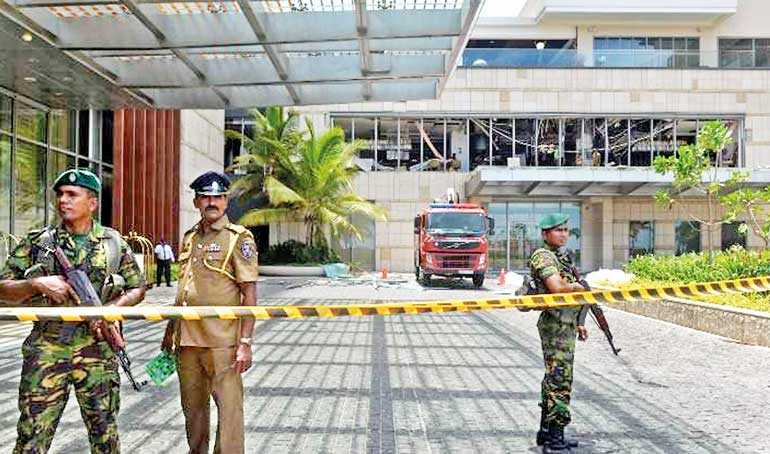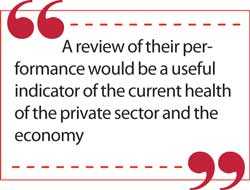Sunday Feb 22, 2026
Sunday Feb 22, 2026
Tuesday, 18 June 2019 00:00 - - {{hitsCtrl.values.hits}}

The companies that are listed in the stock market have announced their financial performance for the first quarter (January – March) of 2019. A review of their performance would be a useful indicator of the current health of the private sector and the economy.
Non-performing loans hit banks
The banking sector as a whole has witnessed a decline in profits in the quarter compared to the first quarter last year (2018). The key reason has been the rising trend in non-performing (bad) loans, which has resulted in steep provisioning (impairment costs) which has eroded profitability.
The increase in impairment costs for the three large banks Commercial, HNB and Sampath are substantial at Rs. 770 million, 3,080 million and 1,500 million respectively. The debt repayment levy has taken out a further Rs. 576 million, 584 million and 512 million respectively.
As a result, these banks have recorded declines in profits to the tune of 24%, 55%, and 25%.
Most conglomerates record declines
JKH, the largest of the conglomerates in the stock market, has experienced an over Rs. 6 billion decline in profit compared to the first quarter last year. However that is predominantly due to a change in contract liabilities (of well over Rs. 3 billion) arising from a transfer of a one off surplus in 2018.
Carsons Group has also recorded a hefty deterioration in profits mainly as the previous year profit was boosted by an insurance claim of over Rs. 1 billion as compensation for the damage caused by the floods. High interest costs have sharply decreased the profit for Hayleys Group by 72%. The performance of the Softlogic Group is similar, reporting a 79% decline in profit from the first quarter of 2018.
An exceptionally strong increase in profit was reported by the Hemas Group. Although their Healthcare and Consumer segments seem to have declined, a sharp improvement in the Leisure segment has boosted the profit. Aitken Spence Group has reported a marginal 4% improvement in profit.
Declines in F&B
Continuing the past trend, Ceylon Tobacco remains the steadiest in terms of performance yet again, recording a modest but steady 9% improvement in profit. Nestle and Ceylon Cold Stores have also reported declines in profit, while Cargills have seen an improvement, although from a low base as the profit for the first quarter of 2018 was sharply lower from 2017.
Downward trend for plantations
Lower taxes have helped to boost profit for Kegalle, Namunukula and Watawala Plantations. Kelani Valley and Talawakelle Plantations have recorded declines in profitability. Decline in selling prices in dollar terms have affected the performance.
Competitive pressures continue for hotels
The large hotel sector companies, Asian Hotels and Properties, Aitken Spence Hotels and Keels Hotels have continued to record declines in profitability as increasing room inventory and the competition has negated the impact of the increase in tourist arrivals.
Mixed performance in manufacturing sector
The Tile sector companies Royal Ceramics, Lanka Tiles and Lanka Walltiles have recorded high ‘other income’ which has prevented a fall in profits. Tokyo Cement has reported an improvement in profit after recording declines for several quarters. Tee Jay Lanka has also witnessed an improvement in profit in rupee terms while the improvement is only marginal in dollar terms.
A windfall for telecoms
The two Telecom sector companies Dialog and SLT have benefitted from the appreciation of the rupee during the quarter. The two companies have recorded forex gains (Rs. 1.5 billion and 0.2 billion respectively) which has boosted their profits.
Overall performance weak
The overall performance indicates a decline in profit, while selected companies have performed better than the others.
Therefore this underlines the weakness in the economy which should be seen in the economic growth for the first quarter of 2019 (which would be released shortly). The GDP growth fell to 1.8% in the last quarter of 2018.
A steep challenge for 2019
The 21 April terrorist attack and the virtual economic halt the country witnessed for several weeks afterwards, would further strain performance of the private sector and the economy in the second quarter of 2019 (April – June). Therefore the performance is likely to deteriorate further in the second quarter.
While the country is gradually getting back to normalcy, one could hope for a recovery in the third quarter (July –September). It would be paramount to ensure that no further terrorism or communal violence erupts.
(The writers could be contacted via [email protected].)